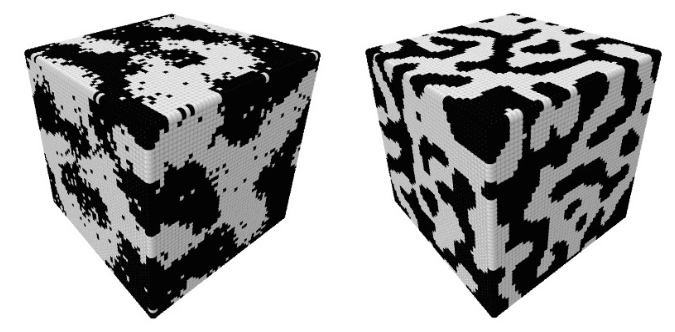1.
Leonardo D. Machado Cristiano F. Woellner, Pedro A. S. Autreto
The Influence of Morphology on the Charge Transport in Two-Phase Disordered Organic Systems Journal Article
Em: Mater. Res. Soc. Symp. Proc., vol. 1737, 2015.
@article{Woellner2015,
title = {The Influence of Morphology on the Charge Transport in Two-Phase Disordered Organic Systems},
author = {Cristiano F. Woellner, Leonardo D. Machado, Pedro A. S. Autreto, Jose A. Freire, Douglas S. Galvao},
url = {http://journals.cambridge.org/action/displayAbstract?fromPage=online&aid=9707375&fulltextType=RA&fileId=S1946427415005023},
doi = {10.1557/opl.2015.502},
year = {2015},
date = {2015-05-22},
journal = {Mater. Res. Soc. Symp. Proc.},
volume = {1737},
abstract = {In this work we use a three-dimensional Pauli master equation to investigate the charge carrier mobility of a two-phase system, which can mimic donor-acceptor and amorphous- crystalline bulk heterojunctions. Our approach can be separated into two parts: the morphology generation and the charge transport modeling in the generated blend. The morphology part is based on a Monte Carlo simulation of binary mixtures (donor/acceptor). The second part is carried out by numerically solving the steady-state Pauli master equation. By taking the energetic disorder of each phase, their energy offset and domain morphology into consideration, we show that the carrier mobility can have a significant different behavior when compared to a one-phase system. When the energy offset is non-zero, we show that the mobility electric field dependence switches from negative to positive at a threshold field proportional to the energy offset. Additionally, the influence of morphology, through the domain size and the interfacial roughness parameters, on the transport was also investigated.},
keywords = {},
pubstate = {published},
tppubtype = {article}
}
In this work we use a three-dimensional Pauli master equation to investigate the charge carrier mobility of a two-phase system, which can mimic donor-acceptor and amorphous- crystalline bulk heterojunctions. Our approach can be separated into two parts: the morphology generation and the charge transport modeling in the generated blend. The morphology part is based on a Monte Carlo simulation of binary mixtures (donor/acceptor). The second part is carried out by numerically solving the steady-state Pauli master equation. By taking the energetic disorder of each phase, their energy offset and domain morphology into consideration, we show that the carrier mobility can have a significant different behavior when compared to a one-phase system. When the energy offset is non-zero, we show that the mobility electric field dependence switches from negative to positive at a threshold field proportional to the energy offset. Additionally, the influence of morphology, through the domain size and the interfacial roughness parameters, on the transport was also investigated.
2015
1.

Leonardo D. Machado Cristiano F. Woellner, Pedro A. S. Autreto
The Influence of Morphology on the Charge Transport in Two-Phase Disordered Organic Systems Journal Article
Em: Mater. Res. Soc. Symp. Proc., vol. 1737, 2015.
Resumo | Links | BibTeX | Tags: ab initio, conductance, nanowires
@article{Woellner2015,
title = {The Influence of Morphology on the Charge Transport in Two-Phase Disordered Organic Systems},
author = {Cristiano F. Woellner, Leonardo D. Machado, Pedro A. S. Autreto, Jose A. Freire, Douglas S. Galvao},
url = {http://journals.cambridge.org/action/displayAbstract?fromPage=online&aid=9707375&fulltextType=RA&fileId=S1946427415005023},
doi = {10.1557/opl.2015.502},
year = {2015},
date = {2015-05-22},
journal = {Mater. Res. Soc. Symp. Proc.},
volume = {1737},
abstract = {In this work we use a three-dimensional Pauli master equation to investigate the charge carrier mobility of a two-phase system, which can mimic donor-acceptor and amorphous- crystalline bulk heterojunctions. Our approach can be separated into two parts: the morphology generation and the charge transport modeling in the generated blend. The morphology part is based on a Monte Carlo simulation of binary mixtures (donor/acceptor). The second part is carried out by numerically solving the steady-state Pauli master equation. By taking the energetic disorder of each phase, their energy offset and domain morphology into consideration, we show that the carrier mobility can have a significant different behavior when compared to a one-phase system. When the energy offset is non-zero, we show that the mobility electric field dependence switches from negative to positive at a threshold field proportional to the energy offset. Additionally, the influence of morphology, through the domain size and the interfacial roughness parameters, on the transport was also investigated.},
keywords = {ab initio, conductance, nanowires},
pubstate = {published},
tppubtype = {article}
}
In this work we use a three-dimensional Pauli master equation to investigate the charge carrier mobility of a two-phase system, which can mimic donor-acceptor and amorphous- crystalline bulk heterojunctions. Our approach can be separated into two parts: the morphology generation and the charge transport modeling in the generated blend. The morphology part is based on a Monte Carlo simulation of binary mixtures (donor/acceptor). The second part is carried out by numerically solving the steady-state Pauli master equation. By taking the energetic disorder of each phase, their energy offset and domain morphology into consideration, we show that the carrier mobility can have a significant different behavior when compared to a one-phase system. When the energy offset is non-zero, we show that the mobility electric field dependence switches from negative to positive at a threshold field proportional to the energy offset. Additionally, the influence of morphology, through the domain size and the interfacial roughness parameters, on the transport was also investigated.


